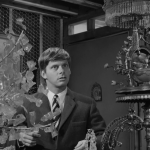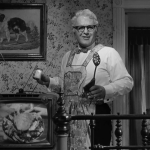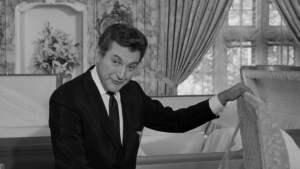
 This is the kind of film that should be seen by happenstance. A deliberate viewing can’t match the delicious pleasure of stumbling upon it by chance. I really shouldn’t even be telling you about it.
This is the kind of film that should be seen by happenstance. A deliberate viewing can’t match the delicious pleasure of stumbling upon it by chance. I really shouldn’t even be telling you about it.
In 1947, the British novelist Evelyn Waugh was approached by Hollywood for a possible filming of his novel Brideshead Revisited. The book’s two essential components were a heavy dose of the mystical upper-class Catholisism which exists only in England and bears no resemblance to Catholicism anywhere else, and a steamy homosexual yearning that manages to never mention homosexuality. The idea that this would have been made into a film even vaguely resembling the original was ludicrous, but Waugh was happy to let Hollywood give him an all-expense-paid trip to Los Angeles to haggle. Waugh had no intention of going through with the deal. Waugh was a snob — he was revolted that “lower-class” service people spoke to him as an equal, detested American informality, and complained about everything. But snobs often write the best satire (think Thackeray), as they have no compunctions about hurting people’s feelings. Hollywood is a bizarre, artificial, and goofy place even for Americans, and Waugh found plenty of material for his next satirical novel, The Loved One, which appeared in 1948. He was particularly fascinated by Americans’ peculiar attitudes towards death and (to a Brit) weird funeral customs. The plot is simple: A young Englishman with a posh education but no particular ambition wins a trip to Hollywood, and stays with an Uncle who is a stalwart in the expat British community in the film studios. His host commits suicide, leaving him to fend for himself on this alien planet. Attending to his uncle’s funeral, he becomes involved with Aimée Thanatogenos, an embalmer working at Whispering Glades Cemetery, a spectacularly vulgar Disneyland of Death created by the megalomaniac Blessed Reverend Glenworthy. He encounters an assortment of lunatics, all of them displaying extreme versions of American culture that Waugh found offensive and laughable. As in many of Waugh’s books, and many of the same ilk, the “hero” displays no noticeable virtues other than not being one of the loonies.
Tony Richardson, a British director who had scored big with critically acclaimed and financially successful films (Look Back in Anger; The Entertainer; A Taste of Honey; The Loneliness of the Long Distance Runner; Tom Jones) filmed the book in 1965. The script was written by the wildly unlikely combination of Terry Southern and Christopher Isherwood. Southern is not much read now, but in 1965 he was in literary vogue, and usually paired with Kurt Vonnegut as a satirist. Isherwood was a gay playwright and novelist who had chronicled the sexual underground of Weimar Germany, and would later reach a wide audience with Cabaret. Waugh had viciously caricatured Isherwood in one of his novels, but in that catty literary crowd such things apparently did not matter much. The film script sticks fairly close to the book, but adds a some scenes that make it fit in better with 1965. These additions would, I suspect, have been fine with Waugh. Visually, the film is a feast. Every shot fills the eye with details just as funny as the situations and the dialog. Every cut serves a satiric purpose. But the real bonanza is the casting. Aimée Thanatogenos is played to perfection by Anjanette Cormer, whose remarkable talent was never well-used by Hollywood. The English hero is played by Robert Morse, one of the few American actors at the time who could convincingly play an Englishman — while the vulgar American film mogul is played by Roddy MacDowall, then still best known as a former English child star. Liberace turns in a hilarious performance as a funeral director — he really missed a chance to be a great comic film actor. Jonathan Winters plays both the Reverend Glenworthy and his incompetent twin brother, making each character a gem. Rod Steiger chews the scenery with the mother-obsessed and nearly psychotic Mr. Joyboy. Paul Williams is a child rocket scientist. The actual Hollywood English Contingent (regularly cast as “Lords and butlers”) essentially play themselves: John Gielgud, Robert Morley, Alan Napier. Milton Berle, James Coburn, Margaret Leighton, Barbara Nichols, Lionel Stander, and Bernie Kopell do well-crafted bits. There are numerous Hollywood in-jokes that the audience could hardly have been expected to catch. For example, the cowboy film star who is being absurdly voice-coached by the studio to play an English Lord is played by Robert Easton. Easton was himself a voice coach, and one of the worlds greatest authorities on English dialects. Many in the cast were closeted gays. Tab Hunter plays a tour guide!
It’s extraordinary that this satirical film, made 54 years ago, based on a book written 71 years ago, remains relevant and bitingly funny.
